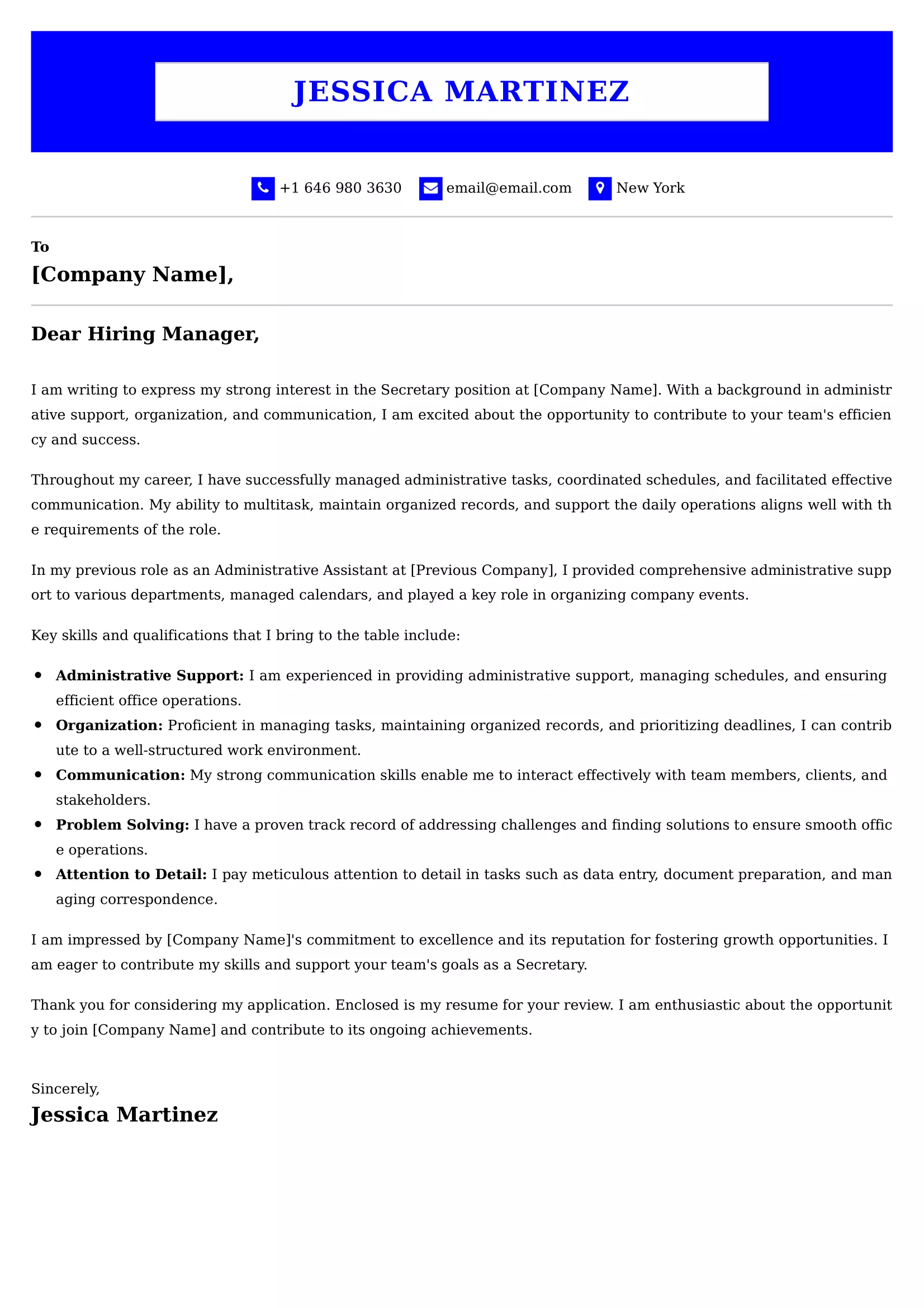Cover Letter
Cover Letter examples for top Clinical Director jobs
Use the following guidelines and Cover Letter examples to choose the best Cover Letter format.
Clinical Director Cover Letter Sample

About Clinical Director Cover Letters
Welcome to our Clinical Director Cover Letter Examples page! Crafting a persuasive cover letter is crucial when applying for a Clinical Director position. Your cover letter should effectively highlight your skills, experience, and leadership abilities in healthcare management. Here, you'll find comprehensive information on salary details, key skills, current trends, and professional tips to help you compose an outstanding Clinical Director cover letter.
Salary Details for Clinical Directors
Clinical Director salaries in Canada can vary significantly based on factors such as location, healthcare facility, and experience. On average, Clinical Directors can expect an annual salary ranging from $80,000 to $150,000 or more, with potential for higher compensation based on qualifications and facility size.
Key Skills for a Clinical Director Cover Letter
When writing your Clinical Director cover letter, make sure to emphasize the following key skills:
- Healthcare Leadership: Highlight your experience in leading healthcare teams, ensuring quality care delivery, and achieving strategic goals.
- Clinical Expertise: Showcase your knowledge of clinical practices, regulations, and compliance in your specialty area (e.g., nursing, therapy, radiology).
- Budget Management: Discuss your proficiency in managing healthcare budgets, controlling costs, and resource allocation.
- Quality Improvement: Mention your ability to drive continuous improvement in clinical care, patient outcomes, and safety.
- Interdisciplinary Collaboration: Emphasize your capacity to collaborate with medical staff, administration, and support services.
Current Trends in Clinical Director Cover Letters
Stay current with these trends to make your Clinical Director cover letter stand out:
- Value-Based Care: Highlight your experience in transitioning to and optimizing value-based care models.
- Telehealth Integration: Discuss your involvement in implementing and managing telehealth services, especially in response to the COVID-19 pandemic.
- Population Health Management: Mention your knowledge of population health strategies and initiatives to improve community health.
- Certifications: Include relevant certifications (e.g., Certified Healthcare Executive, CPHQ) to demonstrate your qualifications and commitment to excellence.
- Patient-Centered Care: Emphasize your dedication to patient-centered care, focusing on improved patient experiences and outcomes.
Professional Tips for Writing a Clinical Director Cover Letter
To create an effective cover letter:
- Customize it: Tailor your cover letter for each job application, addressing the specific requirements of the role and healthcare facility.
- Highlight Achievements: Share examples of how you've improved clinical care, patient outcomes, or operational efficiency in previous roles.
- Show Enthusiasm: Express genuine interest in the healthcare facility and the Clinical Director position by researching the organization.
- Conciseness Matters: Keep your cover letter concise, typically one page or less, to maintain the reader's interest.
- Proofread Carefully: Eliminate any typos or grammatical errors to present yourself as detail-oriented and professional.
Frequently Asked Questions (FAQs)
- Q: Is it necessary to include references in my Clinical Director cover letter?
- A: It's not required to include references in the cover letter; provide them when requested.
- Q: How should I address my cover letter if I don't know the hiring manager's name?
- A: Use a generic salutation like "Dear Hiring Manager" or "To Whom It May Concern."
- Q: What's the ideal tone for a Clinical Director cover letter?
- A: Maintain a professional and confident tone, highlighting your qualifications and enthusiasm for the role.
- Q: Should I include my certifications in the cover letter?
- A: Yes, include relevant certifications to demonstrate your qualifications and commitment to professional development.
- Q: How can I address a career gap in my cover letter?
- A: Address career gaps honestly but positively, focusing on any skills or experiences gained during that time.
More Resume Examples for the Next Step in Your Clinical Director Resume Career jobs
- Anesthesia Technician Resume
- Clinical Director Resume
- Dialysis Technician Resume
- Doctor Resume
- Ekg Technician Resume
- Hospital Volunteer Resume
- Intensive Care Physician Resume
- Medical Coding Specialist Resume
- Medical Records Specialist Resume
- Certified Lactation Consultant Resume
- Nuclear Medicine Technologist Resume
- Optometrist Resume
- Pediatrician Resume
- Physician Assistant Resume
- Registered Mri Technologist Resume
- Speech Language Pathologist Resume
- Ultrasound Technician Resume
More Cover Examples for the Next Step in Your Clinical Director Cover Career jobs
- Anesthesia Technician Cover Letter
- Clinical Director Cover Letter
- Dialysis Technician Cover Letter
- Doctor Cover Letter
- Ekg Technician Cover Letter
- Hospital Volunteer Cover Letter
- Intensive Care Physician Cover Letter
- Medical Coding Specialist Cover Letter
- Medical Records Specialist Cover Letter
- Certified Lactation Consultant Cover Letter
- Nuclear Medicine Technologist Cover Letter
- Optometrist Cover Letter
- Pediatrician Cover Letter
- Physician Assistant Cover Letter
- Registered Mri Technologist Cover Letter
- Speech Language Pathologist Cover Letter
- Ultrasound Technician Cover Letter
Get started with a winning Cover Letter template
Cover Letter Magic: Expert Examples to Make Your Words Shine!
Step into the world of "Cover Letter Magic." Here, you'll find a treasure trove of expertly crafted 700+ cover letter examples that will help your words shine. These examples are like a special guide that shows you how to write amazing cover letters. They cover all kinds of jobs and situations, and each one has been checked by an expert who knows all about cover letters.
Cover Letter Examples
See what our customers says
Our Cover Letter Are Shortlisted By










